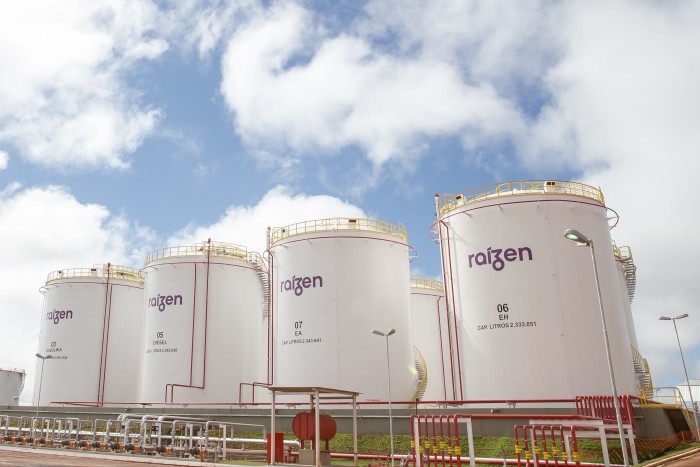
When the world’s top diplomats arrived in Brazil for G20 meetings earlier this year, they were greeted by a fleet of cars carrying a message of national pride: “Powered by Brazilian ethanol.”
Since the Latin American country decided, in the 1970s, to reduce its dependence on imported oil and gas, ethanol has played a crucial role in Brazil’s energy mix.
The vast majority of cars sold today in the nation run on fuel flex technology that allows them to use either petrol or the biofuel, which is almost 40 per cent cheaper and cuts carbon emissions by about 75 per cent.
With a favourable climate and abundant land to grow the primary ingredients — sugar cane or corn — Brazil has emerged, alongside the US, as one of the world’s largest producers and exporters of ethanol. In the past decade, national production has risen more than 28 per cent to reach 222mn barrels last year.
“In addition to improving our carbon footprint, ethanol has also fulfilled an economic mission of reducing dependence on imports of oil-based fuels,” says Thiago Duarte, head of equity research at investment bank BTG.
And, at the centre of this industry, is São Paulo-based Raízen — the world’s largest producer of sugar and sugar cane ethanol, and an operator of electricity, fuel distribution and retail businesses.
Between 2019 and last year, Raízen’s revenues more than doubled to BRL$245bn ($47bn) from BR$120bn, according to company figures, placing it 394th on the latest FT-Statista list of the fastest-growing companies in the Americas. In the same period, profits swelled to BR$2.44bn from BR$2.25bn.
Shell and the Brazilian conglomerate Cosan each own 44 per cent of the company, with the remaining 12 per cent publicly listed. Raízen’s market capitalisation is currently around BR$4.75bn.
Part of the company’s growth was fuelled by strong performances at its distribution and electricity businesses. But executives are most animated about ethanol, especially so-called second-generation ethanol, which is produced from the leftover pulp from crushed sugarcane, known as its bagasse. As its production is sustainable, using only the waste byproduct, this type of ethanol is classified as an advanced biofuel.

“The most important growth is coming from the renewable production of advanced biofuels — that is where the core of our growth is,” says Ricardo Mussa, chief executive. “Until two years ago, we were only using one-third of the energy — that from the [sugarcane] juice. Now, we’ve developed technology that gets [another third from] the bagasse by putting an enzyme into it.”
Much of the demand is being driven by Japan, California and, in particular, Europe, which has imposed stringent requirements for renewables but is reluctant to trade farmland for ethanol production — the so-called food versus fuel debate. “I have no issue with demand today,” says Mussa. “At first, we said ‘let’s test the market’ and see if it would be willing to contract volumes for a long period of time with minimal price guarantee. And, to my surprise, they wanted everything we have.”
He says the second-generation ethanol is being used in fuels blended with petrol, bioplastics and chemicals. But there is also growing interest in using it to make sustainable aviation fuel because its longer-term supply is relatively stable. This offers advantages over used cooking oil — a more established method of making sustainable aviation fuel but the supply of which can be unreliable.
However, the big question hanging over Raízen and Brazil’s broader ethanol sector is how rapid will be the shift to fully electric vehicles, led by China, Europe and the US.
Electric car sales in Brazil are starting to take off, presenting a threat to the company’s core ethanol business. But experts say the bigger problem is the impact that a longer-term divergence between EV and biofuel markets will have on future innovation and competitiveness.
“We are [getting] further and further from the technological frontier,” says Luciana Castilla, an energy transition researcher at the University of São Paulo. “Decades ago, Brazil made a conscious decision to focus on biofuels because of the geopolitical situation at the time. Forty years on, they seem [like] they don’t want to change course.”
But Mussa, like many in the sector, defends ethanol as a good choice for emerging economies, which do not have the resources to invest in building the infrastructure for EVs. “Brazil is a developing country, it has to be cheap,” he says. “When we look at the entire equation, it makes much more sense [to use ethanol]. We already have an installed car manufacturing industry. We have the flex fuel technology. I see a different [kind of] development here, [more] like in Africa or India.”
He added that the subject of EVs had less resonance in Brazil, because the country’s electricity mix is already almost 90 per cent renewable thanks to its prowess in hydro, solar and, more recently, wind power. “For Europe, there is no other way,” he says. “They don’t have enough biofuel to decarbonise, so I understand [why they will use EVs]. In Brazil, this is not an issue.”
Buoyed by the prospects of second-generation ethanol — particularly for use in sustainable aviation fuel — and strong global demand, Mussa is confident that Raízen’s growth will continue.
“I see we are in the right time, in the right place, with the right plant: sugar cane. So everything is in my favour,” Mussa says.
“I tell my guys: ‘If we don’t succeed, we are stupid’. We have no excuse, right?”

